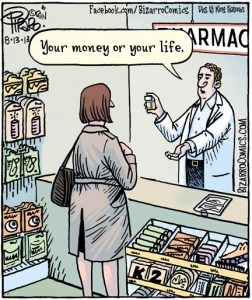Pharmaceutical Industry Cases
Mylan’s EpiPen Pricing Scandal
Each year about 3.6 million Americans are prescribed EpiPen, the epinephrine auto-injector. The EpiPen is a life-saving treatment for anaphylactic reactions, which are caused by allergens such as nuts, seafood, and insect bites. A sharp increase in EpiPen’s price between 2009 and 2016 caused outrage, and prompted debate over whether Mylan N.V, the owner of EpiPen, acted unethically. Beyond the behaviour of Mylan, EpiPen’s price increases raise questions about the conditions of the US pharmaceutical market, and whether existing regulations and laws are sufficient to protect consumers. READ MORE…
Pharmaceutical Industry Ethics: Part 2 of the Valeant Pharmaceuticals Series
In a capitalist free market, the goal of business is to sell a product to satisfy demand. The company’s objective is to maximize profit, without breaking the laws of the land. This profit motive is generally accepted as a characteristic of the free market and rarely raises ethical questions. However, there are industries where social good may take precedent over profit. The pharmaceutical industry presents one instance. READ MORE…
The Valeant Pharmaceuticals Case: Part 1 of the Valeant Pharmaceuticals Series
This case study is about Valeant Pharmaceuticals, a Canadian-based multinational pharmaceutical company. The company is under investigation for its pricing practices, which have allegedly resulted in extremely high prices on medicines in the U.S. market. Additionally, its inappropriate disclosure of inter-corporate relations alarmed investors, who are concerned about possible manipulation of the insurance system. READ MORE…
China and Corruption: The Case of GlaxoSmithKline
GlaxoSmithKline (GSK) is Britain’s biggest drug maker. Chinese authorities found GSK guilty of bribing both hospitals and doctors to help promote their products in China, using a network of nearly seven hundred travel agencies to pay medical professionals, health-related organizations, and government officials. According to Chinese authorities, GSK funneled about 3 billion yuan, or US$482 million, through this network to recipients. Receipts were forged for purchases and transactions that never took place, including fake conferences. At first, GSK denied any involvement in the bribes. READ MORE…

